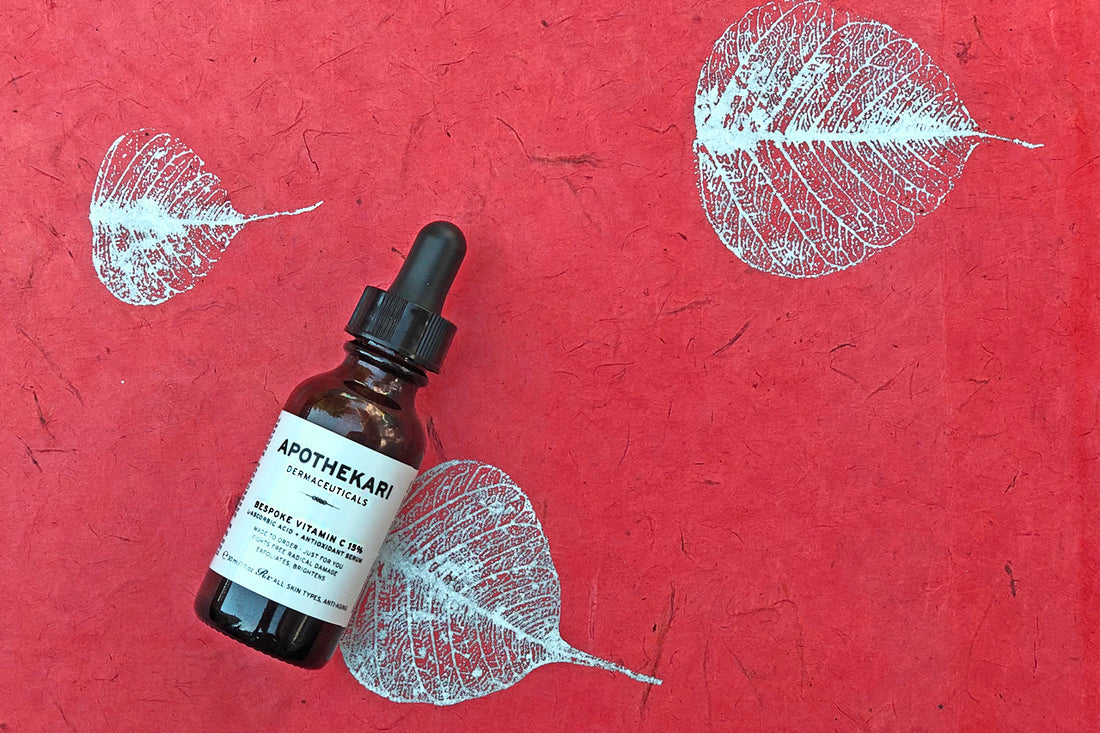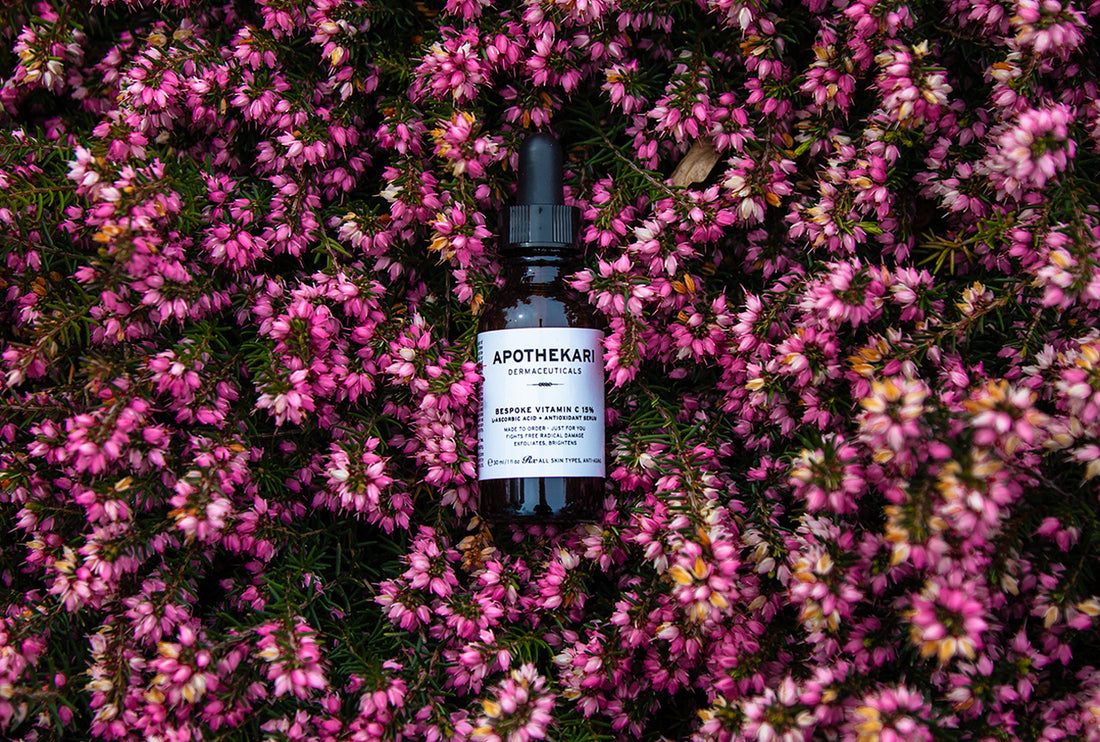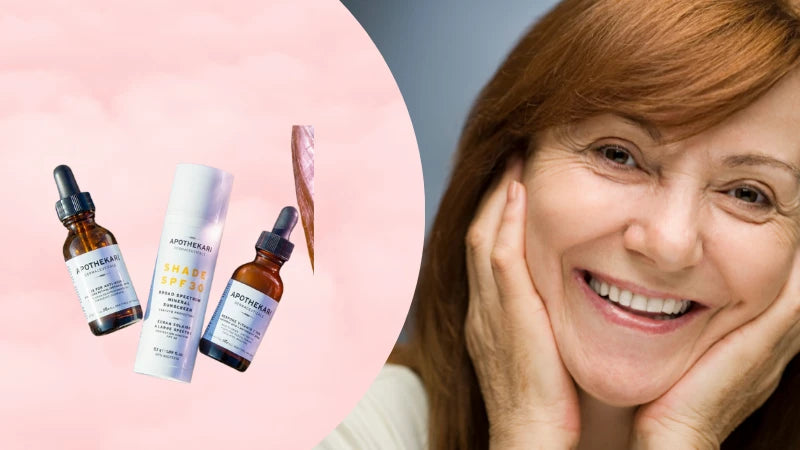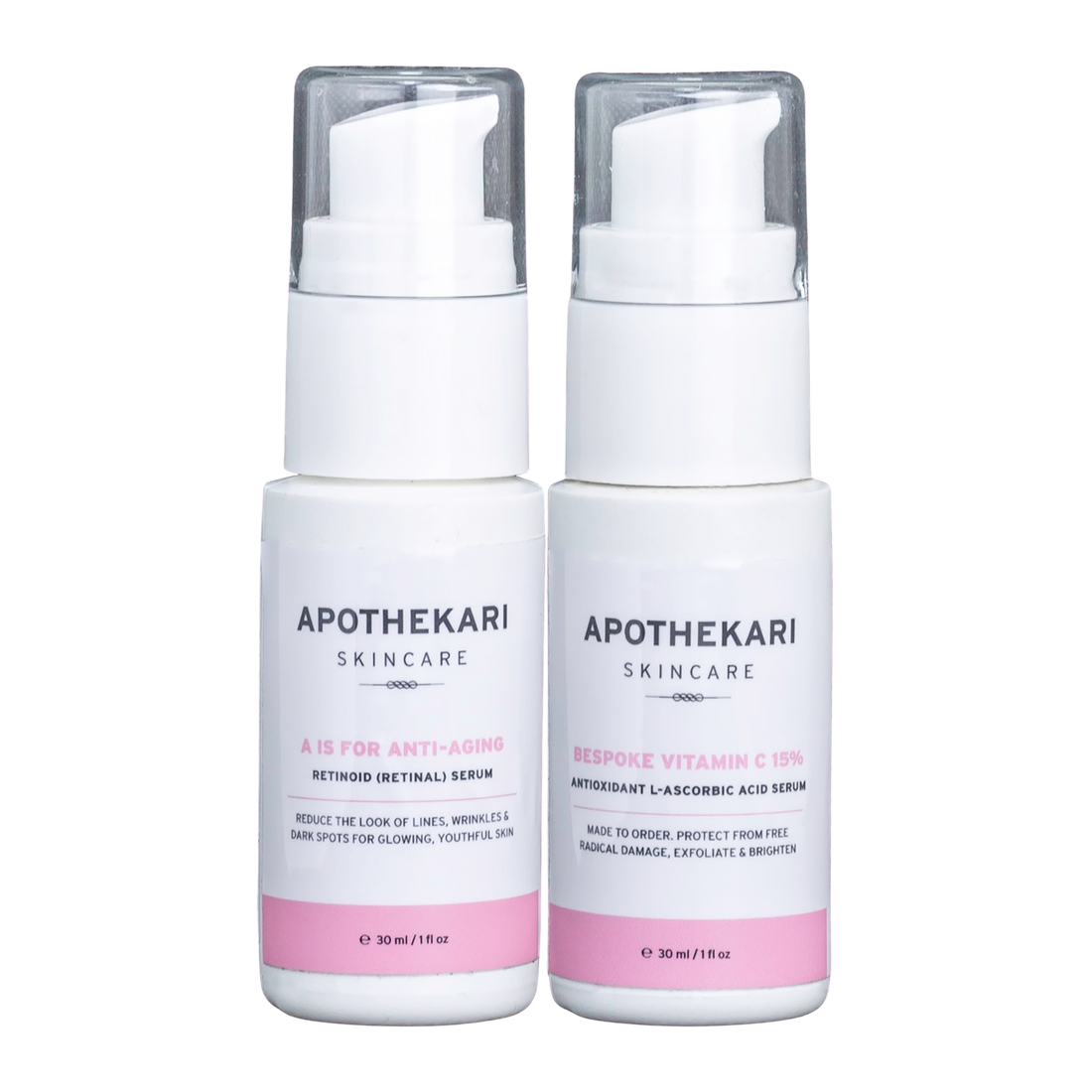Blog
Eat This Healthy Watermelon Salad All Summer Long
This easy, AND, healthy watermelon salad delivers the juicy, cooling hydration that my body craves when the temperature rises. One of the great things about this salad is that it’s soooo versatile. Eat it as a side, as a snack, an appetizer or as a main (just add in more protein). Make it vegetarian—or vegan—throw in your leftovers and call it a day! Shop All Apothekari This is a healthy watermelon salad too! Watermelon is packed with antioxidants and amino acids and also low in calories—1 cup has only 40. The pumpkin seeds (if you use) and olive oil deliver healthy fats and if you throw in some greens and a bit of protein, you’ve got a delicious full meal. Want to get our 5 top tips to help you look your best as you ride the waves of your body’s changes? Click here to get your FREE GUIDE. Healthy Watermelon Salad Ingredients (for 4 servings) 5 tsp extra-virgin olive oil 1 tablespoon fresh lemon juice 2/3 teaspoon kosher salt 3-4 cups watermelon chunks (1 1/2-inch) 2-3 tablespoons finely chopped mint leaves Optional & Substitutions (*faves) *2/3 cup crumbled feta cheese *pumpkin seeds *olives (as much as you like) ? sub basil for mint cucumbers bed of greens finely chopped jalapenos, as hot as you want *Tajin seasoning (a Mexican seasoning made with chili peppers, lime and salt. You may need to adjust seasonings above if you use this so be mindful. (I ? this over any fruit – great with mangos too!) I tend to keep this salad vegetarian but see if you like it with chicken or tuna. Let me know if you try! Directions Whisk the oil, lemon juice, salt. Drizzle dressing over the watermelon and mint. (If you’re using greens, I like to add it in this step) Top with feta, olives and any other toppings. Adjust seasoning if needed. Tip: Put the watermelon in the fridge before cubing. I find it enhances its flavor. Enjoy!
Learn moreThis is How to Show Off Ageless Skin Effortlessly
Ageless skin, skin that’s healthy, radiant and beautiful, is the goal for most of us.
Learn moreHere's How To Protect Skin From Free Radical Damage
Free radical damage isn’t as scary as it sounds! While it can be harmful, there are many ways to protect your skin. Learn how in this post. Shop Bespoke Vitamin C 15% Here’s How a Free Radical Can Damage Skin If you’ve ever cut into an apple and watched it turn brown after awhile, you’ve witnessed oxidation, something that a free radical is responsible for. A similar thing happens in our skin, but over a period of decades instead of minutes. Free radicals, often referred to as Reactive Oxygen Species (ROS), are highly unstable molecules that are missing an electron. In their search for stability (another electron), a free radical steals one from a stable molecule, causing that molecule to become unstable. This leads to a chain reaction, known as a free radical cascade, that creates more free radicals. Eventually, this process causes damage to our cell membranes, proteins and DNA. When it comes to our skin’s structure, components like collagen, elastin and hyaluronic acid are damaged leading to premature skin aging including visible signs like fine lines and wrinkles and dullness. What Causes Free Radicals? Free radicals are caused by everyday biochemical reactions that occur in our body, but thankfully we have control over lots of external factors that trigger and increase their production: UV Light. Moderate sun exposure is good for us – we need it, it produces vitamin D after all. But, overexposure triggers free radicals, which can lead to DNA damage along with photoaging and hyperpigmentation Like sun exposure, pollution can trigger free radicals, ultimately leading to skin damage Smoking isn’t just bad for our overall health. Cigarette smoke contains free radicals cause a range of problems including premature skin aging Excess alcohol, processed food and those high in saturated fats, are some of the worst offenders for triggering free radicals This is the Best Way to Neutralize Free Radical Damage Minimize free radical damage by eating well (up the fruits & veggies, nuts & oily fish – reduce alcohol), minimizing sun exposure, and stopping smoking. And, add in antioxidants! Antioxidants work by donating one of their own electrons to a free radical without becoming unstable, helping to stop the cascade of damage. Vitamins A, C and E are the most well-known, but several others, including, ferulic acid, green tea, astaxanthin, lycopene, etc. also benefit skin. When it comes to antioxidants, the more the merrier. We’ve formulated our Bespoke Vitamin C Serum, to include not only Vitamins C & E, but also ferulic acid, green tea extract along with others. The moisturizing serum base protects skin from damage and restores its youthful and radiant appearance. Have you tried a Vitamin C serum before?
Learn moreThis Is How to Avoid Sun Damaged Skin Every Summer
Want to avoid sun damaged skin this, and every, summer? Learn how in this post! SHOP RADIANT SKIN SET Also known as premature aging or photoaging, sun damage refers to skin that’s been wrecked by exposure to the sun’s harmful ultraviolet (UV rays). There are ways to prevent, and to repair, some of this damage. Read on for more information. Every time you go outside or sit by a window without sun protection, or use a tanning bed, you’re putting yourself at risk for skin damage. Over time, this damage can build up, leading to skin changes making you look years older than you normally would. Changes include: Wrinkles and fine lines Age spots and other pigmentation Loose skin Spider veins Blotchy or ruddy complexion Tanning beds can cause these changes to occur very quickly, sometimes in as little as a year! The damage can lead to deeper lines or dry, scaly patches – actinic keratoses (AKs), pre-cancerous skin growth, which can lead to skin cancer. You Can Protect Against Sun Damaged Skin. Reverse It Also Radiant Skin Set The best way to decrease your chances of sun damaged skin is to protect yourself from the sun’s UV rays. Don’t sit out with unprotected skin – wear long sleeves and put on sunglasses Seek shade wherever possible Minimize sun exposure when UV rays are strongest, between 10 am and 4 pm. Use a well-formulated sunscreen with a minimum SPF 30 whenever possible. Curious about how to use sunscreen properly? Read more here. Adding in an antioxidant formulation like our Glow Getter 3, helps protect skin further. Antioxidants like vitamin C and E and green tea, are antioxidants that help protect skin from the free radical damage that comes with sun exposure. Free radicals are unstable molecules that attack skin’s proteins (collagen and elastin, for example), lipids and worst of all, DNA. Antioxidants help protect against this kind of damage. We like to apply Bespoke Vitamin C every morning underneath our sunscreen. Already have skin that’s damaged? Retinoids, a class of ingredients that come from Vitamin A, have been shown to help reverse some of the damage. Retinoids boost collagen production in skin, helping to maintain its firmness. Our Advanced+ Renewal contains retinaldehyde, a gentle and highly effective retinoid, along with other actives, which helps to reduce the appearance of wrinkles and fine lines, brighten skin, reduce hyperpigmentation and protect it against sun damage. Find both serums in our Radiant Skin Set. Is It Time to Visit Your Dermatologist? If your skin is seriously sun damaged, and you’ve tried topical treatments without much success, you may want to check in with your dermatologist. A dermatologist can help to determine if a prescription treatment may be more suitable. Or, if you’re a candidate for a medical procedure: Laser Resurfacing. Intense beams of light can remove layers of sun damaged skin and trigger the formation of collagen, leaving skin looking healthier Chemical Peels. Strips away sun-damaged skin Photorejuvenation (also known as intense pulsed light – IPL). Bursts of pulsed light are used to reach the deeper layers of skin and smooth out sunspots and freckles Microdermabrasion. Buffs off the top layer of skin with sand-like particles, which stimulates the growth of new skin underneath. Bleaching Creams. Bleaching chemicals smooth out uneven skin coloring. Sun Damaged Skin – Prevention is Always Best! Wear sunscreen every day. Minimize sun exposure. Add in an antioxidant and a retinoid into your skincare routine. There’s really no reason for sun damaged skin. We can keep our skin looking good for decades if we just take care of it.
Learn moreThis Serum Can Fight Free Radicals
Learn how to fight free radicals, molecules which can damage skin, by adding this serum to your daily skincare routine. Shop Bespoke Vitamin C 15% What Are Free Radicals? ‘Free radicals’ AKA Reactive Oxygen Species (ROS) impact our health, including that of our skin. They are created in our bodies as a result of exposure to certain different physical or chemical conditions or illness, including pollution, UV rays, some pesticides and smoke along with the consumption of excess alcohol and some fried foods. Free radicals are thought to contribute to diseases such as heart disease, autoimmune disorders (like rheumatoid arthritis), diabetes and degenerative diseases (Huntington’s or Parkinson’s disease) as well as cancer. Age-related changes in our appearance, including a loss of skin elasticity, wrinkles, graying hair, hair loss, and changes in hair texture are also thought to be related to free radicals. That’s why it’s important to fight free radicals. How to Fight Free Radicals in Skin Once free radical damage starts, it’s thought that a ‘cascade’ of damage occurs, producing more free radicals and speeding up the process of cell damage. This buildup of free radicals offers one explanation for why even healthy bodies age and deteriorate over time. Antioxidants are highly stable molecules, which donate an electron to free radicals, reducing their path of destruction and thereby lessening the damage they cause. Because they are so stable, antioxidants can do this without becoming free radicals themselves. Our bodies make several important antioxidants – glutathione, catalase, superoxide dismutase – and we can help to fight free radicals even further by consuming antioxidant rich foods or by applying them topically. One single antioxidant isn’t enough; we benefit from a combination of including the following: Vitamin C Vitamin E Ferulic acid Green Tea Resveratrol Coenzyme Q10. Apothekari Bespoke Vitamin C Serum is made with a combination of antioxidants and designed to fight free radicals, promote collagen synthesis, brighten skin tone and improve the appearance of aging skin. It is available in a 10% (sensitive skin) or 15% concentration (non-sensitive skin) and each bottle is made fresh to order, guaranteeing its potency. Apply to skin daily every morning to fight free radicals leaving skin looking more youthful and radiant. Top Tip: Eat Your Antioxidants While the topical application of antioxidants is beneficial to skin, we can’t discount the importance of nutrition. Fruits, vegetables and spices including onion, garlic, turmeric, cinnamon and ginger are a major source of antioxidants, which can help to reduce the risk of developing certain diseases. Enjoy the variety; it is the spice of life after all!
Learn more3 Essential Skin Care Products for Summer
3 essential skin care products, found in our Anti-Aging Set, are important to protect and perfect skin this summer and year-round. (*Shade SPF 30 and our Anti-Aging Set have been discontinued. Our Radiant Skin Set includes the same 2 serums that were included in our Anti-Aging Set.) SHOP RADIANT SKIN SET Protect Skin & Prevent Damage Hands up if you love the sun! Sunshine and the sun’s heat make us feel good. The sun’s rays may be great for our mental health, but they’re not so kind to our skin. In fact, it’s estimated that unprotected exposure to the sun’s ultraviolet rays are responsible for more than 80% of skin damage. Regular sunscreen use along with topical antioxidants help to protect skin and prevent damage caused by the sun and our environment. Sunscreens, like Shade SPF 30 help to block the UVA and UVB rays that are responsible for sunburn and skin aging. Shade SPF 30 is a naturally safe, mineral-based zinc oxide sunscreen that offers broad spectrum, non-whitening sun protection and should be used every day, year round. Antioxidants work to protect skin from the free radicals that are generated by exposure to UV rays, pollution, smoke and other environmental factors. Free radicals are unstable molecules which harm skin and accelerate aging by destroying substances including collagen and elastin, proteins which are important to maintain youthful looking skin. Our Bespoke Vitamin C Serum is made to order and contains L-ascorbic acid plus additional antioxidants to not only protect skin, but also boost collagen production, brighten skin and moisturize. Essential Skin Care Products To Perfect Skin While preventing skin damage is the first step in keeping skin healthy, it’s also important to support skin with treatments that help to repair and perfect it. This is where retinoids come in. Retinoids, like retinaldehyde, found in our A is for Anti-Aging Serum, work by ‘turning on’ genes and cells that are involved in collagen production. Used regularly, this essential skin care product can help to reverse sun damage and promote healthier skin including: Reduce the appearance of wrinkles and fine lines Brighten skin Increase skin moisture content and soothe skin irritation Assist in management of acne and blemishes (retinaldehyde has antibacterial activity) A bonus of A is for Anti-Aging is that retinaldehyde is an effective and gentle retinoid, making it suitable for most skin types. 3 Essential Skin Care Products in One Set Because these 3 products – a sunscreen, an antioxidant treatment and a retinoid – are fundamental to great skin, we’ve combined them into our Anti-Aging Set, which currently features a $40 gift certificate. Summertime Skin Care is Year Round Skin Care While we tend to focus on sun protection in the summer, it’s important all year. The sun emits more UVB rays during the summer (UVB rays are responsible for burning) but emits the same amount of UVA rays regardless of season. UVA rays penetrate deeper than UVB rays and are the ones responsible for skin aging including the risk of developing some types of skin cancer. Consider sunscreen the number one essential skin care product and use it every single day!
Learn moreBeat Sun Damage This Summer
Sun damage, caused by unprotected exposure to the sun’s ultraviolet (UV) rays, is one of the main factors involved in aging skin with research showing that it is responsible for more than 80% of the damage. In this post, learn how a combination of the right products (found in our Anti-Aging Set, and which currently features a $40 gift certificate to apply to a future purchase), plus safe sun habits can help you to beat sun damage and minimize its effects, when it occurs. Our Anti-Aging Set has been discontinued, but consider our Ageless Skin Set. Shop Apothekari Ageless Skin Set The Sun is Your Skin’s Worst Enemy One can’t deny how good sunshine feels on our skin. Yet, UV rays are the primary cause of premature skin aging and skin cancer. Protecting your skin against sun damage is the most important thing you can do to help keep your skin looking healthy and beautiful, yet most people don’t take this seriously. The sun produces two main types of UV rays that cause sun damage: UVA and UVB. UVA rays are longer penetrating rays, which reach deep into the skin. They can trigger skin cancer and also break down the skin’s supporting network, including the destruction of elastin and collagen, which ultimately leads to fine lines, wrinkles and saggy skin. UVA rays also disrupt melanin, leading to skin discolourations, AKA age spots. UVB rays are shorter rays and they are primarily associated with sunburns. However, they are also responsible for premature aging and skin cancer. Long term exposure to UV rays impacts the skin’s ability to produce components such as antioxidants, essential fatty acids, ceramides, hyaluronic acid, etc., that are essential to its wellbeing. In addition to skin cancer, other undesirable changes may occur: Increased fine lines and wrinkles Uneven skin tone and discoloration Dry, thin and crepey looking skin A build-up of dead, dry skin cells, leaving skin looking dull and lifeless Sunscreens & Antioxidants Protect Against Sun Damage To fight against UV damage, protect your skin with a broad spectrum UVA/UVB sunscreen. Choose a product with a minimum of SPF 30 and use it every day, year round. Apothekari Shade SPF 30 is a zinc oxide, mineral-based sunscreen that is non-whitening and contains additional antioxidant protection. It’s never too late to start using sunscreen and the sooner, the better. Remember to reapply sunscreen if you are going to be outside for a long time or sweating. Don’t forget your lips, ears and the tops of your feet. Antioxidants complement the benefits of sunscreen by helping to defend against the free radical damage that accompanies UV rays. We recommend that you layer on an antioxidant treatment every morning under your sunscreen to take advantage of the one-two punch that you’ll get from this combination. Our Bespoke Vitamin C Serum contains l-ascorbic acid plus an arsenal of antioxidants including vitamin e, green tea extract, ferulic acid and pomegranate seed oil to help protect skin. Each bottle is made to order to guarantee freshness. Correct the Effects of Sun Damage Anti-Aging Set While sunscreen and sun protection are the best way to protect and prevent sun damage, products are available that can help to diminish its impact when it occurs: Retinoids, like retinaldehyde, found in our A is for Anti-Aging Serum, visibly diminish the appearance of wrinkles and other signs of aging by boosting collagen production and increasing skin cell turnover Vitamin C. In addition to its antioxidant benefits, vitamin C can brighten skin and help to make it appear more evenly toned. Find it in our Bespoke Vitamin C Serum Treatments such as alpha hydroxy acids (AHAs) or beta hydroxy acid (BHA) help to remove the buildup of dry, dead skin that cause dullness, resulting in more radiant skin. Our Anti-Aging Set contains A is for Anti-Aging (retinoid serum), Bespoke Vitamin C Serum (Vitamin C + antioxidants) and Shade SPF 30 (suncreen). This combination of 3 products is one of the most effective ways to help defeat sun damage. Lifestyle Tips While topical products can help to protect and perfect skin, these tips will go a long way to helping protect skin against sun damage: Cover up with a hat, sunglasses and long sleeves. Seek shade where possible Stay out of the sun during peak hours between 10 am and 4 pm Who’s ready for summer?
Learn moreHow to Choose the Best Vitamin C Serum for Your Face
What is Vitamin C? If you’re serious about skincare, you likely know that vitamin C (as found in our Bespoke Vitamin C 15% Serum) is a must have in your routine and in this post, let’s help you find the best vitamin c serum for your face. Buy Bespoke Vitamin C 15% Serum Vitamin C belongs to a group of molecules known as antioxidants, substances which stop oxidation, a chemical reaction that results in the production of free radicals. Often referred to as ROS – reactive oxygen species – free radicals are harmful substances which can damage cells. The sun’s UV rays, pollution and cigarette smoke are some of the biggest contributors to the development of free radicals. Antioxidants like vitamin C are able to protect against free radical damage by donating one of their electrons to stop the chain reaction that results in damage. They do this without making themselves unstable. Damaged proteins, lipids and DNA in skin accelerate the aging process resulting in a change in skin structure. They can also trigger inflammation, leading to a breakdown of collagen. The end result? More wrinkles, fine lines, hyperpigmentation, saggier skin along with some types of skin cancer. Why You Need a Vitamin C Serum Our bodies manufacture some antioxidants, which deliver a range of body-wide benefits, but vitamin C isn’t one of them. In order to obtain adequate amounts of Vitamin C, it’s important to consume foods like fruits and vegetable (citrus fruits, guavas, bell peppers and kiwi fruit contain high amounts), which are rich in this important vitamin. Vitamin C is involved in many bodily processes: Collagen production Neurotransmitter production Plays a role in protein metabolism Assists with wound healing. Its antioxidant properties help limit the damage caused by free radicals and may help to prevent the development of certain diseases including cancer. A lack of vitamin C leads to scurvy, that condition experienced by sailors on long sea voyages in the mid-19th century. Vitamin C Skin Benefits Vitamin C is a normal part of the skin’s makeup, but aging causes a decline. Excessive exposure to UV light, pollution (including smoke and ozone) can also lower the skin’s Vitamin C content. While skin benefits from a vitamin C rich diet, skin care experts agree that topical application is the most efficient way to get good concentrations to skin where it helps in several ways: Limits damage caused by UV rays Contributes to collagen synthesis which helps to support skin Increases skin hydration. Studies suggest that vitamin C helps skin retain moisture by reducing transepidermal water loss (TEWL). Additionally, it may promote the synthesis of lipids, which helps to further protect against dryness. Skin Lightening/Brightening. Vitamin C reduces the production of melanin, which can help to lighten and brighten skin tone. How to Choose the Best Vitamin C Serum for Your Face L-ascorbic acid is the form of Vitamin C that has the most research to back up its skin benefits, but many other effective forms of Vitamin C are available as well. This includes ascorbyl glucoside, amino ascorbyl phosphate, sodium ascorbyl phosphate, tetrahexyldecyl ascorbate, magnesium ascorbyl phosphate, etc. All can help skin and should be evaluated individually when deciding which is the best vitamin c serum for your face. If you decide that the best vitamin C serum for your face is one that contains L-ascorbic acid, ensure that you purchase from a reputable brand. L-ascorbic acid, while highly effective, is also notoriously unstable. If a serum you are using contains this ingredient and is dark in colour or smells odd, don’t use it as it has likely oxidized and will be ineffective and potentially harmful to your skin. At Apothekari, each bottle of our L-ascorbic acid serum – Bespoke Vitamin C Serum – is made to order ensuring that every bottle is safe and effective for 6 -8 months after purchase. Vitamin C works best when combined with other antioxidants including Vitamin E, ferulic acid, green tea, resveratrol and coenzyme Q10, to name a few. Skin benefits most from formulations containing a combination of ingredients, which work together to deliver benefits. Wherever possible, Vitamin C serums should be applied in the morning prior to UV exposure as UV rays are one of the biggest generators of free radicals. Are you ready to choose the best vitamin C serum for your face?
Learn moreWhat You'll Want to Know About Ergothioneine (Hint: It's an Antioxidant)
We’re big fans of antioxidants at Apothekari because they do so much for skin and while most of us are familiar with ingredients including Vitamins C and E, alpha lipoic acid, green tea or even ferulic acid, ergothioneine (trade name Thiotaine®) has probably slipped under your radar. Is Ergothioneine an Antioxidant? Ergothioneine (pronounced er-go-thigh-o-neen) is an antioxidant amino acid that occurs naturally in the body. It is found in high concentrations around cells prone to free radical damage, helping to protect their mitochondria (which aid in energy production). Our bodies can’t synthesize it, so we need to obtain it from foods we eat. Mushrooms are one of the richest natural sources of ergothioneine so you’re in luck if you’re a fan. What Is Ergothioneine Good For? While the research to support ergothioneine’s use in skin care is limited, studies have shown that ergothioneine not only prevents oxidative damage but also may enable DNA repair in cells subjected to UV light. In a comparison study against idebenone (Coenzyme Q10), ergothioneine was found to be a faster and more efficient antioxidant in helping to protect against reactive oxygen species (ROS) after exposure to UVA rays. Why Antioxidants Like Ergothioneine? When it comes to antioxidants, the more the merrier, despite what you may have come across. There isn’t one miraculous antioxidant and research has shown that our skin does better when we use a wide range of effective antioxidants rather than just one. Antioxidants play very well with sunscreens so it’s a good idea to use them together. While regular sunscreen use is essential to reducing the risk of developing skin cancer and premature skin aging, antioxidants can help to boost your sunscreen’s effectiveness by fighting against the free radical damage from the UV light that passes through sunscreen (no sunscreen can effectively block 100% of UV rays). Even the best sunscreen can use a bit of additional help from an antioxidant. Is Ergothioneine an Antioxidant? The easiest way to get optimal protection against free radicals is to apply a sunscreen along with antioxidants every morning. We like using our Bespoke Vitamin C Serum, formulated with L-ascorbic acid, and a host of additional antioxidants along with Apothekari Shade SPF 30 every day. Shade SPF 30 contains zinc oxide, an effective broad spectrum UVA/UVB blocking sun filter, plus additional support from red algae extract (a UV absorbing substance) and ergothioneine. The combination of these two products will help to defend your skin against assault from UV rays, pollution and any other stressor it may encounter during the day. Let’s hear it for antioxidants like ergothioneine!
Learn more3 Holy Grail Skin Care Products
In this blog post, I’m going to share with you the most important products in my skin care routine, or what I like to refer to as my Holy Grail Skin Care products. Like you, I’m a pretty busy kind of woman so when it comes to managing my life, I’m always on the lookout for ways to simplify things. If there’s a faster, easier or better way to do something, I want to know about it. Radiant Skin Set SHOP RADIANT SKIN SET These Are the 3 Holy Grail Skin Care Products There are lots of good skincare products to choose from, but 3 make the biggest impact on your skin. My hope in sharing these 3 products is that it will help you to prioritize the items in your skin care regimen. If you are inspired to purchase and use fewer products, you’ll benefit from saving time both morning and at night, dealing with less clutter and making a smaller dent in your wallet. You don’t need dozens of skin care products; you just need a few of the right ones. The ones I discuss below are the ones that I consider as my holy grail skin care products. These are products that contain ingredients, which are backed by science to deliver results. The best part is that in my case, there are only 3! Let’s get to it then, shall we? Holy Grail Skin Care #1 Sunscreen You may be sick of hearing me stress the importance of daily sunscreen use. However, protecting your skin from sun exposure is hands down, the MOST important thing you can do to help keep your skin looking young and healthy. Exposure to ultraviolet rays is contributes to more than 80% of skin aging. If I say it all the time, it’s because it really is that important! While most of us are quite familiar with the effects of UVB rays – sunburn, anyone – we appreciate the importance of wearing sunscreen during the warmer, summer months or while visiting faraway tropical locations. UVA rays however, the ones that penetrate deep into the dermis, may not seem to carry as many negative effects but they are responsible for premature skin aging, contributing to both wrinkles and skin aging. They are prevalent year round and can pass through glass, clouds and windows. Both types of rays contribute to skin cancers so it’s not just our vanity at stake here, we’re also talking about our health. Whether you opt for a chemical or physical blocking sunscreen, ensure that it: Protects against both UVA and UVB rays Is photostable (won’t degrade upon exposure to sunlight) and Is a formulation that you enjoy using it. I’m partial to Shade SPF 30, our new mineral based zinc oxide sunscreen, which provides broad spectrum UV protection in a non-whitening base. It’s one of my go-tos every morning. Holy Grail Skin Care #2 A Retinoid It’s not just me, but ask any skin care professional about the importance of retinoids and you will get resounding agreement. Retinoids are absolutely essential to anyone serious about their skin. Derived from vitamin A, retinoids are a class of ingredients that deliver multiple skin benefits – unclogging pores, boosting collagen production to reduce wrinkles and fine lines, speeding up skin cell turnover to even out skin tone & discolouration and smoothing skin as well. Many individuals will start to notice a difference in as little as 4 to 6 weeks. Retinoids have been around since the 1970s when prescription only retinoic acid was approved for the treatment of acne. Soon after, dermatologists and patients began to notice that not only breakouts were diminishing, but that many users experienced a reduction in fine lines and hyperpigmentation as well. Whether you opt for over-the-counter retinol, retinaldehyde or retinyl palmitate or gravitate towards prescription options including retinoic acid or tazarotene, retinoids should be included in your skin care arsenal. Have you tried our A is for Anti-Aging Serum? Formulated with gentle retinaldehyde plus a combination of additional skin actives, it helps to protect against photo-aging, exfoliates, delivers anti-inflammatory/anti-irritant properties and brightens skin as well. Retinaldehyde also demonstrates anti-bacterial properties making it a useful addition in the management of acne as well. Keep the following in mind when using a retinoid: Retinoids are light sensitive so they are best applied at night Retinoids may make your skin worse before it gets better as their use is associated with dryness, redness and flaking. Minimize these side effects by starting slowly, applying one to two nights a week and gradually building up to daily use. If introduced in this way, most individuals can tolerate them well. Don’t use a retinoid if you are pregnant or breastfeeding. Holy Grail Skin Care #3 An Antioxidant Formulation. Which Vitamin C Serum is Best? We’ve written about the importance of using antioxidants previously. Antioxidants are ingredients that help to protect skin from damage caused by free radicals, unstable molecules that cause havoc in the skin, setting off a cascade of skin damage. Free radicals may be generated by pollution, ultraviolet radiation and smoke and we are exposed to them daily. Skin benefits from a mix of antioxidants including Vitamin C (especially L-ascorbic acid, which is backed by the most research), Vitamin E, green tea, ferulic acid, alpha lipoic acid, reservatrol, coenzyme q10, etc. Apply antioxidants in the morning prior to UV exposure in conjunction with your sunscreen to help minimize the impact of free radical damage caused by UV rays. Sunscreens and antioxidants play very well together. Antioxidants may be applied at night as well. While they fight free radicals during the day, at night, they play more of a reparative and rejuvenating role, also helping to replenish the concentration of antioxidants in the skin. Our Bespoke Vitamin C Serum is formulated with L-ascorbic acid plus a range of additional antioxidants including ferulic acid, Vitamin E, green tea extract along with glycerin and sodium hyaluronate to help protect, repair and moisturize skin. Shop Bespoke Vitamin C 15% Let’s hear it for skin care products that really make a difference to skin. What are your holy grail skin care products?
Learn moreAging Skin Products | 9 Treatments That Work
Following on our last post discussing aging skin, let’s look at aging skin products that can help keep skin looking young and vibrant no matter your age. SHOP RADIANT SKIN SET While we have yet to discover the fountain of youth when it comes to aging, science has given us solutions that can help to delay the inevitable. If you’re concerned about skin roughness, uneven skin tone, brown patches, age spots, thin skin and wrinkles, there are some aging skin products and procedures to consider. In this article, let’s take a closer look. Aging Skin Products & Treatments 1. Sun Protection It’s well known that exposure to the sun’s ultraviolet rays is the main cause of skin aging so we can’t discuss aging skin products without mentioning sunscreens. A well formulated sunscreen is THE MOST IMPORTANT aging skin product to include in your arsenal. Sunscreen protects against extrinsic aging (factors that occur outside our bodies), including exposure to sunlight and pollution. In general, choose a broad spectrum product that protects against UVA and UVB rays and is photo-stable. Apothekari Shade SPF 30 can’t be beat for it’s non-whitening, zinc oxide and antioxidant enhanced protection. A water resistant formulation is necessary if conditions warrant. Apply sun protection daily, year round – prevention really is one of the best strategies you can employ. Our post on choosing the safest sunscreen (the most effective too) is a good read if you are looking for guidance regarding product choice. And our store at PhaMix.com stocks a selection of the most effective and best-selling sunscreens you’ll find anywhere. 2. Antioxidants Antioxidants provide protection against free radical damage caused by exposure to UV rays, especially in the stratum corneum, the uppermost skin layer that sits on top of the epidermis. This process helps to reduce collagen degradation. While skin contains some naturally occurring antioxidants such as superoxide dismutase, catalase, alpha-tocopherol, ascorbic acid, ubiquinone, and glutathione, the application of topical antioxidants and a diet rich in antioxidants helps to increase the protection. Vitamins C, B3, and E are considered to be the most important antioxidants because they penetrate the skin easily. When vitamins C and E are combined, their antioxidant ability is higher than with either one used alone. Vitamin B3 (niacinamide) regulates cell metabolism and regeneration and has been shown in some studies to help improve skin elasticity, redness and pigmentation. Our Bespoke Vitamin C Serum contains an arsenal of antioxidants including vitamins c and e along with green tea extract plus other skin beneficial ingredients. 3. Cell Communicating Agents/Cell Regulators In particular, retinoids, including prescription retinoic acid and its derivatives along with over the counter options such a retinol, retinaldehyde and retinyl palmitate. These ingredients work to inhibit the breakdown of collagen and promote its synthesis, helping to maintain the skin’s structural integrity. Our A is for Anti-Aging Serum contains gentle, yet effective retinaldehyde plus other ingredients that deliver photo-aging protection, exfoliate, provide anti-inflammatory/anti-irritant benefits and brighten skin. As an added benefit, retinaldehyde shows anti-bacterial properties towards the acne causing bacteria, P. acnes. Peptides are another class of cell communicating ingredients which have the ability to stimulate collagen synthesis. 4. Chemical Peels/Exfoliants Chemical peels work by using a mixture of ingredients to help remove topical skin layers to deliver more evenly toned and tighter skin. A number of ingredients may be used as peeling agents and the depth of the peel relies on the substance used, its concentration, pH and time of application. You can purchase peels for at home use, which contain alpha hydroxy acids and beta hydroxy acids. View a range of exfoliants at our sister store PhaMix.com here. Because they don’t penetrate very deeply, they are safe and will deliver brighter looking skin. For longer lasting and more dramatic results, you can seek the help of a trained professional to conduct a deeper peel. Depending on the depth of the peel, you can expect an increase in collagen and more hydrated skin. Skin elasticity and wrinkles have also been shown to improve. While you get more dramatic results with deeper peels, the risk for side effects also increases. Hyperpigmentation, solar lentigines and the risk of post-operative infections are some of them. 4. Visible Light Devices Intense Pulsed Light (IPL) & Lasers are newer technologies that come with lower risk and shorter downtime than chemical peels and can improve the structure of the skin. The process relies on lasers, which emit light at varying wavelengths to stimulate new collagen formation. The absorption of light results in the release of inflammatory agents, which in turn stimulate new skin cell development, initiate tissue repair and enhance collagen and elastin formation. Different treatments have varying clinical effects so it is important to work with a trained professional to help select the procedure most suitable for your skin. 5. Injectables and Fillers The goal for injectables is to increase the ability of fibroblasts (responsible for the production of skin cells), enhance cell activity, increase hydration, and the synthesis of collagen, elastin and HA (hyalorunic acid). This is accomplished through the use of microinjections in the dermis with products containing either one active ingredient or a cocktail of different compounds: HA, vitamins, minerals, nutrients, hormones, growth factor, amino acids, etc. Platelet rich plasma (PLP), derived from fresh, whole blood is another ingredient that may be used. More detailed studies are required to evaluate just how effective these protocols are. Fillers, on the other hand, are aging skin products which are injected within or beneath the skin to improve its physical features. These include ingredients such as fat, cultured human fibroblasts, collagen (bovine-derived, human-derived from tissue culture), HA , synthetic or pseudo-synthetic implants (silicone, polymethacrylate microspheres, poly-L-lactic acid, calcium hydroxylapatite microspheres suspended in aqueous polysaccharide gel, alkyl-imide gel polymer). Their effects may be temporary, semipermanent (lasting between 1–2 years), or permanent materials (lasting longer than 2 years). 6. Botox Botulinum toxin (BTX) has no effect on skin texture and doesn’t stop the skin aging process. However, regular injections can slow down the visible aging process by helping to reduce certain dynamic facial lines and wrinkles. 7. Hormone Replacement Therapy As we get older, we synthesize less hormones including growth hormone (GH), and insulin-like growth factor-1 (IGF-1), melatonin (nocturnal), thyroid hormones, dehydroepiandrosterone (DHEA), estrogens, progesterone and testosterone. Studies have shown that supplementation with hormones including DHEA, GH, testosterone (in men), estrogen and progesterone (in women) are associated with a number of beneficial effects including an improvement in skin health. HRT, despite its benefits, has also been associated with negative effects including an elevated cardiovascular risk and increase of the risk of breast cancer. Given the potential for serious side effects, the decision to pursue hormone replacement therapy is something that individuals should discuss with their physician. 8. Plastic Surgery The most invasive of all procedures, plastic surgery is a consideration for individuals who aren’t satisfied with any of the above treatment options. Plastic surgery can help to correct wrinkles, restore (and redistribute) fat and volume loss, augment skin and contour it. It delivers the most noticeable difference to skin. However, this medical procedure comes with a cost – including a high price tag and the potential for medical problems. If you feel that it’s right for you, consult with an experienced and qualified health care professional. I’d be remiss in this post if I didn’t discuss the importance of lifestyle factors in helping to keep skin looking healthy. Not specifically an aging skin product, the impact of influences including sound nutrition, stress management, adequate sleep, physical activity and the avoidance of smoking, excessive alcohol consumption and too much sun can’t be underestimated. As with most things health related, prevention is best and it’s no different when it comes to that of your skin. We’ve covered a lot of different aging skin products in this post. Which are you using? Any you’re curious to try?
Learn moreAntioxidants + Sunscreen = A Winning Combination!
When it comes to sun protection, antioxidants + sunscreen are a winning combination. No one disputes the importance of sun protection in minimizing the damaging impact of ultraviolet (UV) rays on skin. And while daily sunscreen use is one of the best defenses we have to help keep our skin looking young and healthy, you may not be as aware about the role that antioxidants play as well. Antioxidants + Sunscreen: Here’s Why While sunscreens protect from sun damage by either blocking or reflecting UV rays that can lead to sunburn and contribute to sagging skin, wrinkles, age spots and skin cancer, antioxidants help protect skin in a different way. When our skin comes into contact with UV rays, destructive particles called free radicals are created. Free radicals are highly active and unstable molecules that can start a chain reaction of skin inflammation and damage, leading to premature skin ageing and even serious skin health issues. Several studies, including this one have found that antioxidants fight against free radical damage by helping to neutralize them and thereby minimizing their negative impact on skin. While the consumption of high-antioxidant foods delivers them internally, topical application is the most effective way to increase their concentration in the skin. Antioxidants within the skin are depleted when our skin is exposed to the sun during times of sun exposure, but they can (and should) be replaced with topical formulas. Antioxidants. Lots to Choose From There are a number of effective antioxidants to choose from including well known and well-studied Vitamins C and E. Other topical choices include Coenzyme Q10, green tea, lycopene, lutein and lipoic acid. You can find Vitamins C, E, ferulic acid, green tea extract, lutein, lipoic acid and a range of additional antioxidants in made to order Bespoke Vitamin C 15% Serum. Ergothioneine, a naturally occurring amino acid and antioxidant and is included in our new Shade SPF 30 Sunscreen (coming soon!) to help prevent UV damage in conjunction with zinc oxide and red algae extract. Although sunscreens and antioxidants should be part of your UV protection strategy, keep in mind that wearing sunglasses and hats, covering up, seeking shade and staying out of the sun during its peak hours (10 am – 4 pm) are just as important in helping to keep your skin safe. Apply them during the morning to clean, dry skin to ensure protection from daytime sun alongside your sunscreen. Are you down with antioxidants – what’s your favourite?
Learn more












